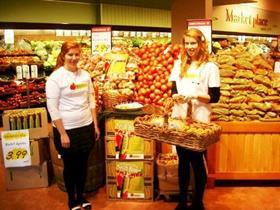
Living up to its name, the new Rockit apple variety is speeding off the shelves this year, in its first marketing season after being licensed to New Zealand grower-exporter Havelock North Fruit Company at the end of May.
The new apple made its first appearance on shelves as part of a programme at UK retailer Marks & Spencer, where it was sold last month in tennis ball tubes to coincide with the Wimbledon Championship.
“We totally ran out of product before we envisaged we would,” Havelock North director Phil Alison told Fruitnet.com. “We’ve had a really healthy pickup.”
Rockit apples, which are being exclusively packed in clear plastic tubes, will also be making an appearance this year in Taiwan – where a new shipment landed on Friday – the US, and on the New Zealand domestic market.
“We’ve just done Taiwan in Asia this year because we’ve only had limited volumes,” said Mr Alison. “Next year we’re also looking at either Singapore or Hong Kong. We’d certainly also like to expand in the US, the UK and New Zealand.”
Rockit’s big appeal is its size and sweetness; the apples are all smaller than 60mm in diameter, with the smallest around the size of a golf ball, and have a similarly small core.
The central thrust of Rockit’s marketing strategy is convenience, and the variety will be pitched both at traditional apple eaters and non-traditional apple eaters, who may see the packaged fruit more as a convenience food than fresh produce. Havelock North is also looking at the corporate and gift markets, stated Mr Alison.
“The timing of it’s very good,” he said. “The produce industry got beaten up with convenience foods like chocolate and potato chips for a long time. But now obesity has come in and it’s time to fight back.
“You can have a tube of these apples in your car, on your desk, in your bag. Those are all the sorts of concepts we’re trying to deliver to the consumer. I don’t think consumers want a big, messy apple any more.”
The next few years will see an increased presence of Rockit apples in the market – production is expected to double for the next five seasons from this year’s roughly 30t, with availability starting in March.
“We’re also aware we have to be available 12 months of the year, which means production in both the Southern Hemisphere and the Northern Hemisphere,” stated Mr Alison. “We’ll be looking for other growers to help champion the brand.”






No comments yet